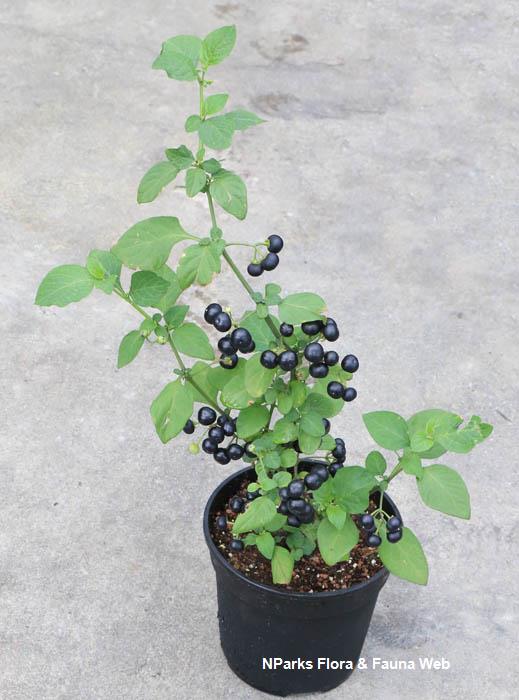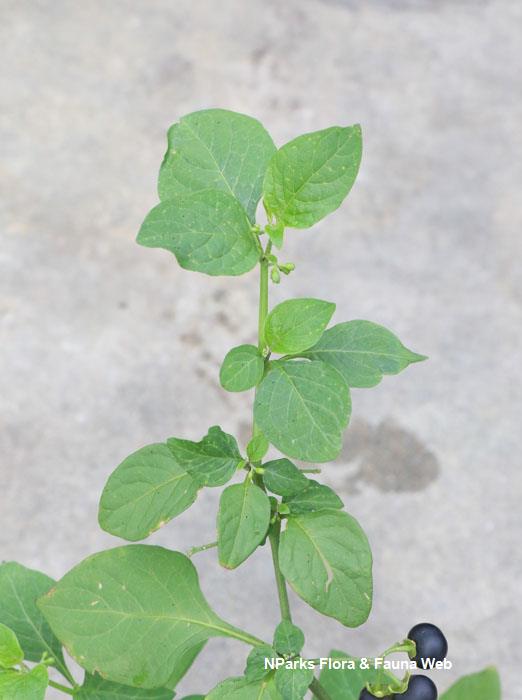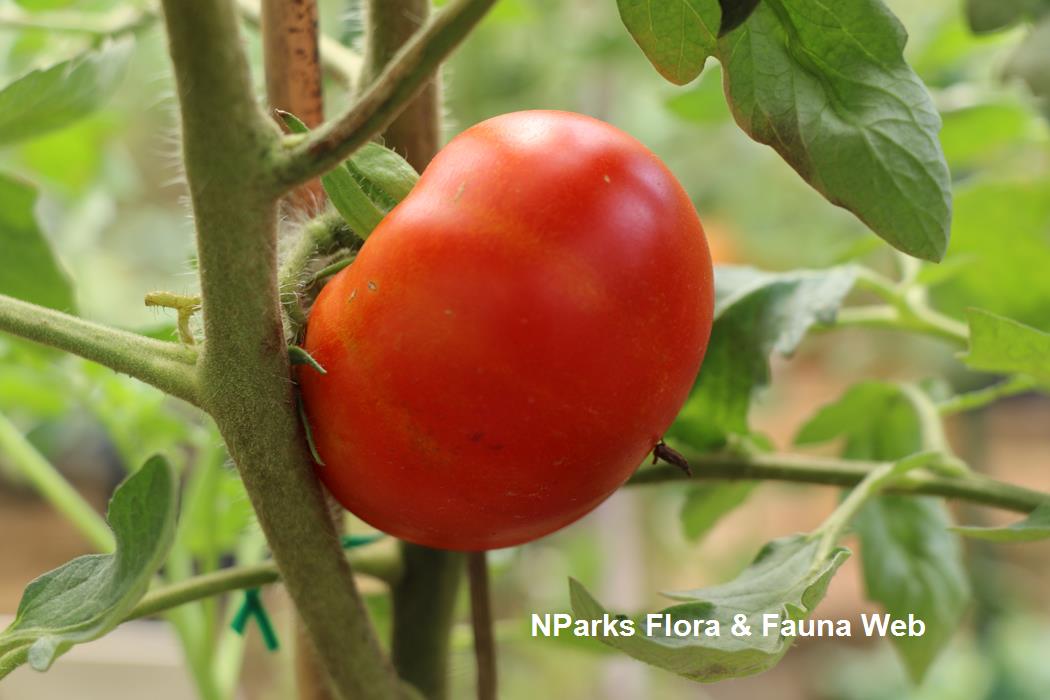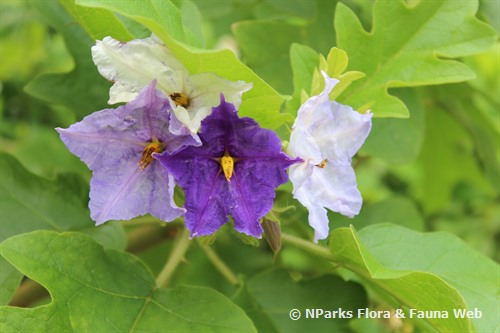
Back
Solanum scabrum Mill.
| Family Name: | Solanaceae |
| Synonyms: | Solanum melanocerasum All., Solanum nigrum var. pterocaulon Schur, Solanum pterocaulon Dunal |
| Common Name: | Garden Huckleberry, 木龙葵 |
Garden Huckleberry (Solanum scabrum) is a short-lived herbaceous plant that bears white star-shaped flowers and dark purple-black berries. It grows as an annual in temperate areas. Growing to about 1.2 m tall, this species flowers all year in the tropics, and does best planted in the ground or in containers under full sun and with moderate watering.
Name
Classifications and Characteristics
| Plant Division | Angiosperms (Flowering Seed Plants) (Dicotyledon) |
|---|---|
| Plant Growth Form | Shrub |
| Lifespan (in Singapore) | Annual |
| Mode of Nutrition | Autotrophic |
| Plant Shape | Shrubby |
| Maximum Height | 1 m |
| Maximum Plant Spread / Crown Width | 1.2 m |
Biogeography
| Native Distribution | Tropical and Southern Africa, and Western Indian Ocean. |
|---|---|
| Native Habitat | Terrestrial |
| Preferred Climate Zone | Tropical |
| Local Conservation Status | Non-native |
Description and Ethnobotany
| Growth Form | A herbaceous plant, sometimes with a woody base. Grows as a short-lived perennial in the tropics and an annual in temperate areas. |
|---|---|
| Foliage | Leaves are simple, broadly ovate to diamond-shaped or rounded, measuring 2 - 10 cm long and 2 - 6 cm wide. The leaf tip is acute, leaf base is cuneate or decurrent. It has entire, sinuate to sparingly dentate margin. Leaf blade is pubescent (fine short hairs) to glabrescent (nearly hairless). |
| Stems | Erect stems, usually angular, pubescent (fine short hairs). |
| Flowers | Flowers are borne in clusters known as umbellate cyme. The calyx is cup-shaped, about 2 mm in diameter and has deltate-ovate lobes. Pedicels are pubescent (fine, short hairs). The petals are white, about 1 cm in diameter, ovate lobes of 2.5 - 5 mm and have short fine hairs on the lower side of the petals. The flower has short filaments and pilose style. |
| Fruit | The fruiting pedicel is deflexed (curves inwards), while the fruiting calyx is reflexed (curves outwards and backwards). The berries are purplish black and somewhat shiny, globose-shaped, about 5 - 10 mm in diameter, bearing many creamy coloured discoid seeds, up to 144 seeds per berry. |
| Habitat | It is found growing near roads, humid places in ravines and valleys, at 200 - 2700 m altitude in its native biome such as savanna, scrubland, woodland, and grassland. |
| Associated Fauna | Flowers attract pollinating bees in Africa and United States (Pennsylvania). |
| Ethnobotanical Uses | Edible Plant Parts : Edible Fruits Food (Fruit or Vegetable): The leaves are eaten as vegetable in South Africa. Both the leaves and fruit of this species are said to have a bitter taste. The fruit should be fully ripened before consumption (fruit turns fully black in colour, and shiny sheen has dulled). <1> Others: The leaves and berries are source for dyes <2>.They are also used as fodder for cattles and goats in Africa. |
Landscaping Features
| Desirable Plant Features | Ornamental Fruits |
|---|---|
| Landscape Uses | Container Planting, Flowerbed / Border, Parks & Gardens, Small Gardens |
Fauna, Pollination and Dispersal
| Fauna Pollination Dispersal Associated Fauna | Bee-Attracting |
|---|---|
| Pollination Method(s) | Biotic (Fauna) (Insects (Bee)) |
Plant Care and Propagation
| Light Preference | Full Sun |
|---|---|
| Water Preference | Moderate Water |
Foliar
| Foliage Retention | Evergreen |
|---|---|
| Mature Foliage Colour(s) | Green |
| Mature Foliage Texture(s) | Hairy / Hirsute |
| Prominent Young Flush Colour(s) | Green |
| Young Flush Texture(s) | Hairy / Hirsute |
| Foliar Type | Simple / Unifoliate |
| Foliar Arrangement Along Stem | Alternate |
| Foliar Attachment to Stem | Petiolate |
| Foliar Shape(s) | Non-Palm Foliage (Ovate) |
| Foliar Venation | Pinnate / Net |
| Foliar Margin | Entire |
| Foliar Apex - Tip | Acute |
| Foliar Base | Cuneate |
Floral (Angiosperm)
| Flower & Plant Sexuality | Bisexual Flowers |
| Flower Colour(s) | White |
|---|---|
| Flower Texture(s) | Hairy / Hirsute |
| Flower Grouping | Cluster / Inflorescence |
| Flower Location | Axillary |
| Flower Symmetry | Radial |
| Individual Flower Shape | Stellate / Star-shaped |
| Inflorescence Type | Umbel |
| Flowering Period | Free-Flowering |
| Flowering Habit | Polycarpic |
Fruit, Seed and Spore
| Mature Fruit Colour(s) | Black |
|---|---|
| Mature Fruit Texture(s) | Smooth |
| Fruit Classification | Simple Fruit |
| Fruit Type | |
| Mature Seed Colour(s) | Orange, Yellow / Golden |
| Seed Description | Discoid seeds. |
| Seed Quantity Per Fruit | Numerous (>20) |
References
| References | <1> Prota4U. https://prota.prota4u.org/protav8.asp?g=pe&p=Solanum+scabrum. Accessed on 17 Dec 2024. <2> Fontem, D.A. & R.R. Schippers. (2004). Solanum scabrum Mill. Record from Protabase. G.J.H. Grubben & O.A. Denton, (Eds). PROTA (Plant Ressources of Tropical Africa / Ressources végétales de l`Afrique tropicale), Wageningen, Netherlands. http://www.prota.org/seach.htm. Accessed on 17 Dec 2024. |
|---|
Image Repository
Others
| Master ID | 34479 |
|---|---|
| Species ID | 8892 |
| Flora Disclaimer | The information in this website has been compiled from reliable sources, such as reference works on medicinal plants. It is not a substitute for medical advice or treatment and NParks does not purport to provide any medical advice. Readers should always consult his/her physician before using or consuming a plant for medicinal purposes. |







